3 June, 2021Due to the recent increase of telework in all sectors, including manufacturing, energy and mining, in consultation with all sectors’ and sections’ co-chairs, especially the co-chairs for the white-collar section, IndustriALL has developed principles and guidelines to support trade unions in their negotiations on legislation, policies and collective agreements on telework.
| Guidelines | ||
 | 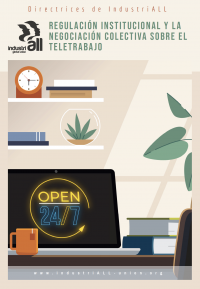 | 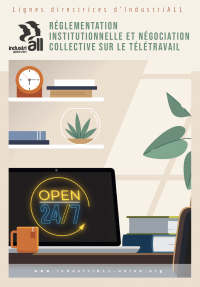 |
| ENG | ESP | FRA |
| Recommendations | ||
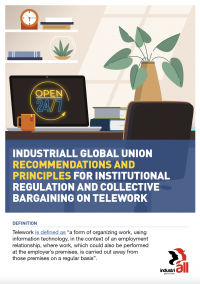 | 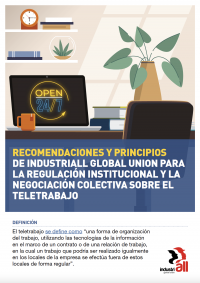 | 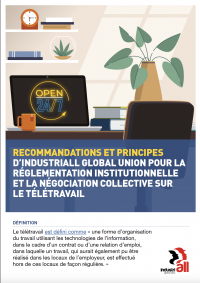 |
| ENG | ESP | FRA |
“Our guidelines on telework are a reflection of what we see as the main challenges that come with it and what is needed to negotiate good protection of workers. We are aware that telework is a developing form of work organization. Thorough reflection and discussion, based on good practice and the assessment of experience, should continue within and between trade unions, workers and employers, to overcome challenges and ensure the optimal protection of workers. Our intention is to develop this material in line with the observed developments,”
says Atle Høie, IndustriALL assistant general secretary.
Telework is nothing new and has grown gradually over the years along with the development of new technologies and digital tools. According to the OECD, in 2015 already, 25 per cent of workers in the manufacturing industry worked remotely at least some of the time, but these figures increased dramatically during the pandemic. According to figures from the European Union, whereas as of 2019, only 5.4 per cent of workers in the EU usually worked from home, close to 40 per cent of EU workers began to telework fulltime as a result of the pandemic.
With the technological leap with digitization of production processes there’s a growing share of white collar workers in the industry, hence increasing the share of the workforce eligible to perform their work remotely.
“This is a very good initiative. We are looking forward to introducing it to IndustriALL affiliates. It will become an important instrument in our trade union fight for workers’ rights in telework and improved work/life balance,”
says Anne-Catherine Cudennec, CFE-CGC, co-chair of the IndustriALL white collar sector.
Remote work will remain a permanent feature of the world of work even after the Covid-19 crisis passes. Telework may have many advantages for workers, including greater autonomy and flexibility, but it also presents a certain level of risks for workers and trade unions .
To prevent such risks telework must be negotiated and employers and governments must ensure this right. It will play an important role in framing the future of work and will contribute to reshaping our societies. Trade unions must be actively involved in the development of new legislation in this area. Collective bargaining at sector, company and workplace levels must play a key role in regulating telework, especially when legislation is weak.
At company level, the health crisis has accelerated the negotiation of agreements and policies on teleworking. IndustriALL has put together some existing clauses in collective agreements on telework, as well legal provisions as a complement to the guidelines.
“These guidelines and principles intend to give trade unions support in their negotiation processes to ensure that telework is an opportunity for an improved quality of work and life for workers, and that flexibility does not lead to a lack of protection and security. I hope they will be used widely and that be beneficial for our affiliates and their members,”
says IndustriALL general secretary Valter Sanches.


